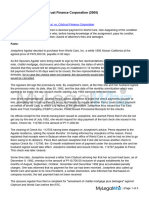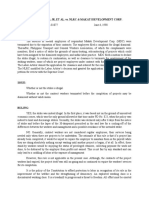Exocet Security V Marcelo
Exocet Security V Marcelo
Uploaded by
Rosalyn Pagatpatan BarolaCopyright:
Available Formats
Exocet Security V Marcelo
Exocet Security V Marcelo
Uploaded by
Rosalyn Pagatpatan BarolaOriginal Description:
Original Title
Copyright
Available Formats
Share this document
Did you find this document useful?
Is this content inappropriate?
Copyright:
Available Formats
Exocet Security V Marcelo
Exocet Security V Marcelo
Uploaded by
Rosalyn Pagatpatan BarolaCopyright:
Available Formats
Exocet Security & Allied Services Corp., vs. Serrano, GR No. 198538, Sept.
29, 2014
FACTS:
Petitioner entered into a contract with JG Summit Holdings, whereby respondent, as employee of the
petitioner, would be assigned as “close-in” security of JG Summit’s corporate officers in September 1994.
After 8 years, he was reassigned as close-in security of Lance Gokongwei, and then to his wife. In 2006,
Serrano was relieved by JG Summit. For more than 6 months, he reported back to Exocet without any
assignment. Thus, in 2007, he filed a complaint for illegal dismissal with the NLRC.
In its defense, Exocet denied dismissing Serrano. It alleged that since there were no VIP assignments available
after Serrano was relieved from JG Summit, the latter was temporarily assigned to general security service. It
added that it was Serrano who refused to accept these assignments as he was not used to being a regular
security guard.
ISSUE:
Whether or not Serrano was constructively dismissed.
RULING:
The petition is meritorious.
There is no specific provision of law which treats of a temporary retrenchment or lay-off and provides for
the requisites in effecting it or a period or duration therefor. These employees cannot forever be temporarily
laid-off. To remedy this situation or fill the hiatus, Article 286 [now 292] may be applied but only by analogy
to set a specific period that employees may remain temporarily laid-off or in floating status. Six months is
the period set by law that the operation of a business or undertaking may be suspended thereby suspending
the employment of the employees concerned. The temporary lay-off wherein the employees likewise cease
to work should also not last longer than six months. After six months, the employees should either be recalled
to work or permanently retrenched following the requirements of the law, and that failing to comply with
this would be tantamount to dismissing the employees and the employer would thus be liable for such
dismissal.
When a security guard is placed on a "floating status," he does not receive any salary or financial benefit
provided by law. Due to the grim economic consequences to the employee, the employer should bear the
burden of proving that there are no posts available to which the employee temporarily out of work can be
assigned.
In this case however, there is no showing that Exocet was in bad faith when it placed Serrano in floating
status for more than 6 months. Serrano’s lack of assignment cannot be attributed to the petitioner. On the
contrary, in as early was one month after Serrano was relieved, Exocet had already offered him general
security service assignment as there were no available VIP contracts, their availability being not wholly within
Exocet’s control.
SC ruled that a security guard’s security of tenure does not give him a vested right to the position as would
deprive the company of its prerogative to change the assignment of, or transfer the security guard to a station
where his services would be most beneficial to the client. Thus, it is manifestly unfair and unacceptable to
immediately declare the mere lapse of the six-month period of floating status as a case of constructive
dismissal, without looking into the peculiar circumstances that resulted in the security guard’s failure to
assume another post. This is especially true in the present case where the security guard’s own refusal to
accept a non-VIP detail was the reason that he was not given an assignment within the six-month period.
The security agency, Exocet, should not then be held liable.
You might also like
- Case Study On Angelo's PizzaDocument19 pagesCase Study On Angelo's PizzaMeaad Bin Quayyum Chowdhury 1735307100% (6)
- Case 8 Philips in ChinaDocument1 pageCase 8 Philips in ChinaJoshua Hines0% (2)
- PLDT vs. PaguioDocument2 pagesPLDT vs. PaguioCaitlin KintanarNo ratings yet
- Primer On GrievancehDocument47 pagesPrimer On GrievancehEks WaiNo ratings yet
- CIR Vs CTADocument1 pageCIR Vs CTAKristine VillanuevaNo ratings yet
- Special Adr RulesDocument22 pagesSpecial Adr Rulesiam560No ratings yet
- Be It Enacted by The Senate and House of Representatives of The Philippines in Congress AssembledDocument3 pagesBe It Enacted by The Senate and House of Representatives of The Philippines in Congress AssembledlexxNo ratings yet
- Almario v. Pal - F-Atienza (d2017)Document2 pagesAlmario v. Pal - F-Atienza (d2017)Kulit_Ako1No ratings yet
- Arica Vs NLRC - G.R. No. 78210. February 28, 1989Document6 pagesArica Vs NLRC - G.R. No. 78210. February 28, 1989Ebbe DyNo ratings yet
- Document 1Document9 pagesDocument 1Carina Jane TolentinoNo ratings yet
- 5 Vda. de VirayDocument31 pages5 Vda. de VirayPatricia SorianoNo ratings yet
- Asset Privatization V TJ EnterprisesDocument7 pagesAsset Privatization V TJ EnterprisesArnaldo DomingoNo ratings yet
- Colegio de San Juan de Letran V Association of Employees and Faculty of LetranDocument8 pagesColegio de San Juan de Letran V Association of Employees and Faculty of LetranNneka VillacortaNo ratings yet
- Ang Tiong V TingDocument4 pagesAng Tiong V TingMp CasNo ratings yet
- Insurance Case Digest Part IIDocument3 pagesInsurance Case Digest Part IISkylee SoNo ratings yet
- CIR vs. Arnoldus Carpentry Shop, Inc., G.R. No. 71122, March 25, 1988 Tax AmnestyDocument2 pagesCIR vs. Arnoldus Carpentry Shop, Inc., G.R. No. 71122, March 25, 1988 Tax AmnestyEim Balt MacmodNo ratings yet
- ESTRELLITA M. BASCOS vs. COURT OF APPEALS and RODOLFO A. CIPRIANODocument2 pagesESTRELLITA M. BASCOS vs. COURT OF APPEALS and RODOLFO A. CIPRIANOShine Dawn InfanteNo ratings yet
- Commando Security Agency Vs NLRCDocument4 pagesCommando Security Agency Vs NLRCPaulo Miguel GernaleNo ratings yet
- CredTrans - Southern Motors V Barbosa - VilloncoDocument2 pagesCredTrans - Southern Motors V Barbosa - VilloncoCHEENSNo ratings yet
- Santuyo Vs RGMI FCDocument6 pagesSantuyo Vs RGMI FClaursNo ratings yet
- Republic Vs Court of AppealsDocument1 pageRepublic Vs Court of AppealsCarlos James0% (1)
- Alvarez V Golden Tri BlocDocument5 pagesAlvarez V Golden Tri BlocJorela TipanNo ratings yet
- Superclean Service Corporation V CADocument11 pagesSuperclean Service Corporation V CAericjoe bumagatNo ratings yet
- 013-Ocampo Jr. v. NLRC, G.R. No. 81077, 6 June 1990Document4 pages013-Ocampo Jr. v. NLRC, G.R. No. 81077, 6 June 1990Jopan SJ100% (1)
- San Beda University College of Law: Cocomangas Hotel Beach Resort v. Visca Austria-Martinez, JDocument3 pagesSan Beda University College of Law: Cocomangas Hotel Beach Resort v. Visca Austria-Martinez, JPatrick PatricioNo ratings yet
- Petitioner Vs Vs Respondents Froilan M Bacungan & Associates Seno, Mendoza and Associates Law OfficesDocument7 pagesPetitioner Vs Vs Respondents Froilan M Bacungan & Associates Seno, Mendoza and Associates Law OfficesPatricia RamosNo ratings yet
- 13 G.R. No. 155059. April 29, 2005 American Wire and Cable Daily Rated Employees Union vs. CADocument6 pages13 G.R. No. 155059. April 29, 2005 American Wire and Cable Daily Rated Employees Union vs. CArodolfoverdidajrNo ratings yet
- 33 - Philippines Singapore Transit Vs NLRCDocument6 pages33 - Philippines Singapore Transit Vs NLRCArthur YamatNo ratings yet
- BARAYOGA Vs APT - Susvilla, Ian H.Document1 pageBARAYOGA Vs APT - Susvilla, Ian H.juhrizNo ratings yet
- Petitioners: Raul G. Locsin and Eddie B. Tomaquin Respondent: Philippine Long Distance Telephone Company DoctrineDocument2 pagesPetitioners: Raul G. Locsin and Eddie B. Tomaquin Respondent: Philippine Long Distance Telephone Company DoctrineKaren Selina AquinoNo ratings yet
- Alcira vs. NLRCDocument3 pagesAlcira vs. NLRCOliver Reidsil M. RojalesNo ratings yet
- J.L.T. Agro, Inc., Represented by Its Manager, Julian L. Teves v. Antonio Balansag G.R. No. 141882. March 11, 2005 FactsDocument4 pagesJ.L.T. Agro, Inc., Represented by Its Manager, Julian L. Teves v. Antonio Balansag G.R. No. 141882. March 11, 2005 Factscassandra leeNo ratings yet
- Shoemart v. NLRCDocument4 pagesShoemart v. NLRCbearzhugNo ratings yet
- Eastern Telecom Philippines, Inc. Vs Eastern TelecomDocument2 pagesEastern Telecom Philippines, Inc. Vs Eastern TelecomBenitez GheroldNo ratings yet
- 16 JRC v. National AllianceDocument2 pages16 JRC v. National AlliancePretz VinluanNo ratings yet
- Spouses Ferdinand Aguilar Et Al Vs Citytrust Finance CorporationDocument3 pagesSpouses Ferdinand Aguilar Et Al Vs Citytrust Finance CorporationThelma CalvoNo ratings yet
- Insular Life Eau v. Insular LifeDocument1 pageInsular Life Eau v. Insular Lifeamsula_1990No ratings yet
- 19 AKELCO V NLRCDocument2 pages19 AKELCO V NLRCPaolo Miguel ArqueroNo ratings yet
- MacapagalDocument13 pagesMacapagalcyhaaangelaaaNo ratings yet
- F Barayoga, Et Al. v. Asset Privatization Trust, GR No. 160073, October 24, 2005Document3 pagesF Barayoga, Et Al. v. Asset Privatization Trust, GR No. 160073, October 24, 2005Denise MarambaNo ratings yet
- Retail Trade Liberalization Act of 2000Document22 pagesRetail Trade Liberalization Act of 2000Tukne SanzNo ratings yet
- (Spbus) Topic - (Put The Case Number) 01 NameDocument3 pages(Spbus) Topic - (Put The Case Number) 01 NamePau SaulNo ratings yet
- CBK Power Company Limited vs. Commissioner of Internal Revenue PDFDocument20 pagesCBK Power Company Limited vs. Commissioner of Internal Revenue PDFLuigi JaroNo ratings yet
- Dentech v. NLRCDocument2 pagesDentech v. NLRCAllen Windel BernabeNo ratings yet
- 27 G.R. No. 162045 March 28, 2006 Ong Vs OlasimanDocument3 pages27 G.R. No. 162045 March 28, 2006 Ong Vs OlasimanrodolfoverdidajrNo ratings yet
- PNP Vs Concepcion Mining CompanyDocument4 pagesPNP Vs Concepcion Mining CompanyWresen AnnNo ratings yet
- Coca Cola Vs Kapisanan NG Malayang Manggagawa Sa Coca Cola-FFWDocument13 pagesCoca Cola Vs Kapisanan NG Malayang Manggagawa Sa Coca Cola-FFWKennethQueRaymundoNo ratings yet
- Leus v. SSCWDocument5 pagesLeus v. SSCWMary Louisse RulonaNo ratings yet
- LIM FILCRO Illegal RecruitmentDocument2 pagesLIM FILCRO Illegal RecruitmentVivienne Nicole LimNo ratings yet
- Central Bank v. MorfeDocument8 pagesCentral Bank v. MorfeKristineSherikaChyNo ratings yet
- Security Bank and Trust Company v. Rodolfo CuencaDocument7 pagesSecurity Bank and Trust Company v. Rodolfo CuencabearzhugNo ratings yet
- 4 Buenviaje Vs Sps SalongaDocument2 pages4 Buenviaje Vs Sps Salongamei atienzaNo ratings yet
- San Miguel Corp Vs NLRCDocument10 pagesSan Miguel Corp Vs NLRCyourcupofcoffeeandteaNo ratings yet
- ERB vs. CADocument3 pagesERB vs. CAANTHONY SALVADICONo ratings yet
- 14 - San Miguel Vs CADocument3 pages14 - San Miguel Vs CAinvictusincNo ratings yet
- RP Vs Fncbny DigestDocument2 pagesRP Vs Fncbny Digestjim jimNo ratings yet
- Lim v. HMR Philippines DigestDocument5 pagesLim v. HMR Philippines DigestMykee NavalNo ratings yet
- De Ocampo vs. NLRCDocument2 pagesDe Ocampo vs. NLRCaxvxxnNo ratings yet
- Goldenberg CaseDocument3 pagesGoldenberg CaseFriendship GoalNo ratings yet
- Francisco vs. NLRCDocument2 pagesFrancisco vs. NLRCLorelie Dema-alaNo ratings yet
- Paz v. Northern Tobacco - MarmolDocument2 pagesPaz v. Northern Tobacco - MarmolAnna Dominique Gevaña MarmolNo ratings yet
- EXOCET Vs Serrano Case DigestDocument2 pagesEXOCET Vs Serrano Case DigestRalph Christian Lusanta Fuentes50% (2)
- 04 Exocet Security & Allied Services Corp. v. Serrano (Digest: Labor)Document3 pages04 Exocet Security & Allied Services Corp. v. Serrano (Digest: Labor)Dany AbuelNo ratings yet
- Earth Life Science Module 4Document6 pagesEarth Life Science Module 4Rosalyn Pagatpatan BarolaNo ratings yet
- Earth Life Science Module 5Document15 pagesEarth Life Science Module 5Rosalyn Pagatpatan BarolaNo ratings yet
- Earth Life Science Module 3Document13 pagesEarth Life Science Module 3Rosalyn Pagatpatan BarolaNo ratings yet
- Columbia Pictures Vs CA DigestDocument1 pageColumbia Pictures Vs CA DigestRosalyn Pagatpatan BarolaNo ratings yet
- Earth Life Science Module 1Document18 pagesEarth Life Science Module 1Rosalyn Pagatpatan BarolaNo ratings yet
- Reviewer Lpac FinalsDocument4 pagesReviewer Lpac FinalsRosalyn Pagatpatan BarolaNo ratings yet
- Bengco vs. BernardoDocument2 pagesBengco vs. BernardoRosalyn Pagatpatan BarolaNo ratings yet
- Coscolluela v. SandiganbayanDocument1 pageCoscolluela v. SandiganbayanRosalyn Pagatpatan BarolaNo ratings yet
- Case DigestDocument5 pagesCase DigestRosalyn Pagatpatan BarolaNo ratings yet
- Bengco vs. BernardoDocument5 pagesBengco vs. BernardoRosalyn Pagatpatan BarolaNo ratings yet
- Case Assignment No. 6 - No. 20 (Digested By: Jetzon) : Vicmar Development Corporation v. ElarcosaDocument1 pageCase Assignment No. 6 - No. 20 (Digested By: Jetzon) : Vicmar Development Corporation v. ElarcosaRosalyn Pagatpatan BarolaNo ratings yet
- Fonterra Brand Phils v. LargadoDocument1 pageFonterra Brand Phils v. LargadoRosalyn Pagatpatan BarolaNo ratings yet
- Imm5812 2-149BL3SLDocument2 pagesImm5812 2-149BL3SLpaulatibochaNo ratings yet
- Scope of RegulationDocument6 pagesScope of RegulationHisham MaassaraniNo ratings yet
- 03 - Litreature ReviewDocument7 pages03 - Litreature ReviewR 2No ratings yet
- PLAI 10 Point AgendaDocument24 pagesPLAI 10 Point Agendaapacedera689100% (2)
- Human Factors and ErgonomicsDocument15 pagesHuman Factors and ErgonomicsAnonymous hcACjq80% (1)
- Kaba Exos 9300 BrochureDocument24 pagesKaba Exos 9300 BrochureKL SimNo ratings yet
- Future of Employee Engagement 2023Document55 pagesFuture of Employee Engagement 2023Deepak S100% (1)
- Ruling in FLSA Lawsuit About 2013 ShutdownDocument13 pagesRuling in FLSA Lawsuit About 2013 Shutdownstevennelson10No ratings yet
- Job Application Form: PurposeDocument6 pagesJob Application Form: PurposeMandisa ZibulaNo ratings yet
- Contracts British English StudentDocument7 pagesContracts British English StudentMargaretNo ratings yet
- HRM FunctionsDocument9 pagesHRM FunctionsbelliissiimmaaNo ratings yet
- Agri Versus Industry Dev EcoDocument28 pagesAgri Versus Industry Dev EcoNeelotpal SahuNo ratings yet
- RFP - Wastewater Utility System - Pump Maintenance and Repair Services (083012)Document24 pagesRFP - Wastewater Utility System - Pump Maintenance and Repair Services (083012)api-281755212No ratings yet
- Loss Prevention: Industry Specific Q&ADocument8 pagesLoss Prevention: Industry Specific Q&AMuhammad SohailNo ratings yet
- DGT - Yrasuegui Vs NLRCDocument6 pagesDGT - Yrasuegui Vs NLRCEmmanuel OrtegaNo ratings yet
- Colombia: Cultural EssentialsDocument47 pagesColombia: Cultural Essentialskinky_zgNo ratings yet
- All India Institute of Medical Sciences, Gorakhpur (Uttar Pradesh)Document5 pagesAll India Institute of Medical Sciences, Gorakhpur (Uttar Pradesh)ShashankNo ratings yet
- Relationship With The Front Office Sales MarketingDocument9 pagesRelationship With The Front Office Sales MarketingMustain RahmanNo ratings yet
- Labor MigrationDocument83 pagesLabor MigrationJoey AustriaNo ratings yet
- BSBLDR601 Lead and Manage Organisational Change: Task SummaryDocument7 pagesBSBLDR601 Lead and Manage Organisational Change: Task SummaryHabibi AliNo ratings yet
- HCM Policy ManualDocument66 pagesHCM Policy Manualvipuljagrawal50% (2)
- Swanson Termination AgreementDocument4 pagesSwanson Termination AgreementMail TribuneNo ratings yet
- BEOLDocument16 pagesBEOLaknisha100% (1)
- The Tall Pines Hotel - Group ProjectDocument3 pagesThe Tall Pines Hotel - Group ProjectAmrit Shakya100% (1)
- UntitledDocument4 pagesUntitledWii-la MentinoNo ratings yet
- Ebro III v. NLRCDocument10 pagesEbro III v. NLRCMarinella ReyesNo ratings yet
- DACUM Chart On TextileDesigningDocument3 pagesDACUM Chart On TextileDesigningAtif MahmoodNo ratings yet





































































































